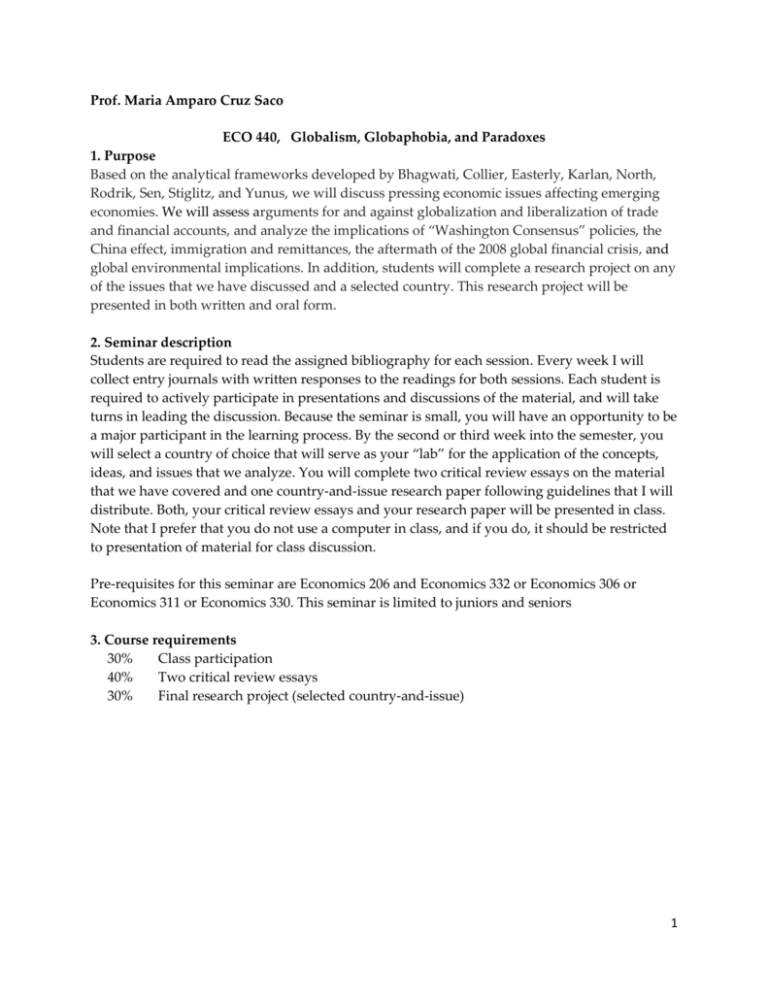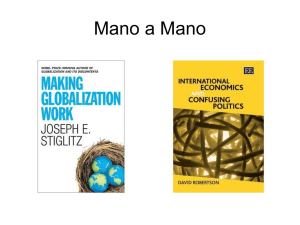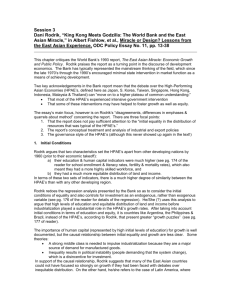Understanding the “Globalization Paradox”
advertisement

Prof. Maria Amparo Cruz Saco ECO 440, Globalism, Globaphobia, and Paradoxes 1. Purpose Based on the analytical frameworks developed by Bhagwati, Collier, Easterly, Karlan, North, Rodrik, Sen, Stiglitz, and Yunus, we will discuss pressing economic issues affecting emerging economies. We will assess arguments for and against globalization and liberalization of trade and financial accounts, and analyze the implications of “Washington Consensus” policies, the China effect, immigration and remittances, the aftermath of the 2008 global financial crisis, and global environmental implications. In addition, students will complete a research project on any of the issues that we have discussed and a selected country. This research project will be presented in both written and oral form. 2. Seminar description Students are required to read the assigned bibliography for each session. Every week I will collect entry journals with written responses to the readings for both sessions. Each student is required to actively participate in presentations and discussions of the material, and will take turns in leading the discussion. Because the seminar is small, you will have an opportunity to be a major participant in the learning process. By the second or third week into the semester, you will select a country of choice that will serve as your “lab” for the application of the concepts, ideas, and issues that we analyze. You will complete two critical review essays on the material that we have covered and one country-and-issue research paper following guidelines that I will distribute. Both, your critical review essays and your research paper will be presented in class. Note that I prefer that you do not use a computer in class, and if you do, it should be restricted to presentation of material for class discussion. Pre-requisites for this seminar are Economics 206 and Economics 332 or Economics 306 or Economics 311 or Economics 330. This seminar is limited to juniors and seniors 3. Course requirements 30% Class participation 40% Two critical review essays 30% Final research project (selected country-and-issue) 1 3. Program Week 1 8/30 Introduction: Sen’s Development as freedom and the role of institutions Amartya Sen, ch 2, The Ends and the Means of Development, in Sen, 1999, Development as Freedom Douglas North, 1989, “Institutions and Economic Growth: A Historical Introduction” 9/4 Good institutions, igniting and sustaining growth Dani Rodrik, ch 1, “Fifty Years of Growth (and Lack Thereof): An Interpretation,” in Rodrik, 2007, One Economy, Many Recipes 9/6 Rodrik’s Criticisms Understanding the “Globalization Paradox” Dani Rodrik, 2011, ch 1-4, The Globalization Paradox Week 2 9/11 Globalization Follies Dani Rodrik, 2011, ch 5-8, The Globalization Paradox 9/13 Giving Globalization a chance Dani Rodrik, 2011, ch 9-12 and the Afterword, The Globalization Paradox Week 3 9/18 Stiglitz’ Criticisms Joseph Stiglitz, 2002, ch 1-4, Globalization and Its Discontents 9/20 Easterly’s Position on Foreign Aid William Easterly, 2002, ch 1-3, The Elusive Quest for Growth Week 4 9/25 Collier’s Growth Traps Paul Collier, 2007, ch 1-6, The Bottom Billion. Why the Poorest Countries Are Failing and What Can Be Done About It 9/27 Yunus’ Social Business proposal Muhammad Yunus, 2007, ch 1-4, Creating a World Without Poverty Week 5 10/2 Karlan’s behavioral economics approach to poverty reduction Dean Karlan and Jacob Appel, 2011, ch 1-5, More Than Good Intentions ------First critical review essay is due 10/4 Bhagwati’s defense of Globalization Jagdish Bhagwati, 2004, ch 1-6, In Defense of Globalization Week 6 10/9 Rising China Eva Paus, Penelope Prime, and Jon Western, eds., 2009, ch 1-3, Global Giant. Is China Changing the Rules of the Game? 2 10/11 China’s threat to Latin America Kevin Gallagher and Roberto Porzecanski, 2010, ch 1-3, The Dragon in the Room Week 7 10/16 The 2008 Global Financial Crisis Joseph Stiglitz, 2010, ch 1-3, Freefall 10/18 The Global Aftermath Carmen Reinhart and Kenneth Rogoff, 2009, ch 13-16, This Time is Different Week 8 10/23 Immigration Hein De Haas, 2005, “International Migration, Remittances and Development: myths and facts,” in Third World Quarterly, vol 26, no 8, pp 1269-1284 Rosemary Vargas-Lundius and Guillaume Lanly, 2008, International migration, remittances and rural development 10/25 Remittances Dean Yang, 2011, “Migrant Remittances,” in Journal of Economic Perspectives, vol 25, no 3, pp 1-24 Week 9 10/30 Motives for remittances Hillel Rapoport and Frédéric Docquier, 2005, The Economics of Migrants´ Remittances, Discussion Paper Series no 1531, Institute for the Study of Labor (IZA) Cruz-Saco, López-Anuarbe, and Park, “Hispanic Remittances and the Gender Gap” (draft) Cruz-Saco, López-Anuarbe, Murdock ’13, and Rudolf ’12, “Hispanics and Remittances in New London” (draft) 11/1 The political economy of the Global Environment Jennifer Clapp and Peter Dauvergne, ch 1, “Peril or Prosperity? Mapping Worldviews of Global Environmental Change” and ch 2 “The Ecological Consequences of Globalization,” in Clapp and Dauvergne, Paths to a Green World Week 10 11/6 The reign of waste Jennifer Clapp, 2002, ch 7, “The Distancing of Waste: Overconsumption in a Global Economy,” in Princen, Maniates, and Conca, eds., Confronting Consumption Aimin Chen, Kim Dietrich, Xia Huo, and Shuk-mei Ho, 2011, “Developmental Neurotoxicants in E-Waste: An Emerging Health Concern,” in Environmental Health Perspectives, vol 119, no 4. David Pellow, ch 5, “Ghosts of the Green Revolution: Pesticides Poison the Global South,” in Pellow, Resisting Global Toxics 11/8 Global environmental issues Kate O’Neil, 2007, “Curbing Toxic Trade: The Basel Convention in the Twenty-First Century” (draft) Sanjeev Khagram, 2004, ch 4, “The Transnational Campaign to Save India’s Narmada River”, in Khagram, Dams and Development. Transnational Struggles for Water and Power 3 Week 11 11/13 DVD “Waste Land” directed by Lucy Walker, 2010. In this documentary artist Vik Muniz travels back from Brooklyn to his native Brazil, and the world’s largest garbage dump, Jardim Gramacho, located in Rio de Janeiro. 11/15 DVD “The Inside Job” directed by Charles Ferguson, 2010. Insightful presentation of the roles and responsibilities of Wall Street, big financial institutions, and regulators in the making of the 2008 financial crisis. Week 12 11/20 DVD “Food, Inc.” directed by Robert Kenner, 2008. A film about America’s corporate controlled food industry. ----------First draft of research paper is due 11/22 Thanksgiving break Week 13 11/27 Synthesizing lessons learned in the seminar ------Second critical review essay is due 11/29 Conclusions of seminar Week 14 12/4 Student presentations of semester long research project 12/6 Student presentations of semester long research project Week 15 12/11 Student presentations of semester long research project Important information --------Academic honor is of utmost importance. Depending on the violation, a student could receive an F grade on the test, assignment or course, and could be suspended or expelled from the College. All students must write the following pledge in every exam before it is handed in for grading: “ I promise neither to give nor receive any aid on this examination.” Please, read the section on academic integrity at http://aspen.conncoll.edu/camelweb/index.cfm?fuseaction=zbook&circuit=4&function=view&ac tion=10063&solution=40&zbook=1584&fuse=plagiarism#zbook1584. If you wish to enhance your writing skills please note that The Roth Writing Center provides one-to-one peer tutoring (free of charge) to help student writers of all abilities during all stages of the writing process. To make an appointment, call x2173 or stop by the Writing Center at 214 Blaustein. If you're a confident, experienced writer we can help you to push your ideas and polish your style; if you're a relatively inexperienced and not-so-confident writer we can also help you, by working on grammar or organization or whatever you need. Writing Center tutors are trained to help you to discover what you think through writing. Working with a tutor gives you the opportunity to share your work-in-progress with an actual reader, so that 4 you can get useful feedback on that work before you have to turn it in for a final grade. For further information, visit the Writing Center web page at http://write.conncoll.edu/. --------If you have a physical or mental learning disability which may require classroom, testtaking or other reasonable accommodation, please let me know as soon as possible. If you have not already done so, please be sure to register with Sherine A. Miller, Director of the Office of Student Disability Services, extension 5240. 5








